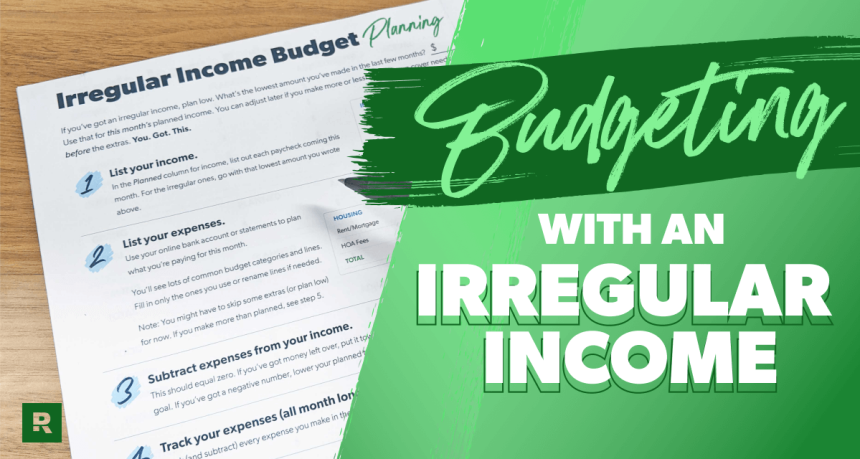If your paycheck is different every month, you’re not alone. Many freelancers, gig workers and commission-based employees face the same challenge of having a variable income.
But you can manage your money with an irregular income (and it’s easier than you think). The secret? A budget—which is just a plan for your money. A budget tells your money where to go so you can stop wondering where it went. Follow these six steps to create a budget that works for you, no matter how much you earn.
How to budget with irregular income:
- List your income (use your lowest monthly income).
- List your expenses (prioritize essential expenses first).
- Subtract your expenses from your income (create a zero-based budget).
- Track your expenses (all month long).
- Make adjustments (every paycheck).
- Make a new budget (before the month begins).
How to Budget With Irregular Income
1. List your income (use your lowest monthly income).
The first step to making a budget is to list your income for the month. But that can be hard when you don’t know exactly how much you’ll make. So, if you’ve got an irregular income, plan low. That’s right—set up your budget based on your lowest monthly income estimate.
It’s way better to start low than to start with an average. Why? Because if you budget low, you can always go up from there. But overestimating and then having to scale back later—that can put you in a real tight spot.
To figure out what income to budget with, look back at your past pay stubs. What’s the lowest amount you’ve made in the last few months? Go with that.
If this is your first time working on commission or having an irregular income, don’t worry! For now, estimate what your lowest month will look like and put that in as your income. With each month, you’ll get a better idea of what your income will actually be.
2. List your expenses (prioritize essential expenses first).
Once you’ve planned for all the money coming in, it’s time to prep for all the money going out—aka your monthly expenses.
Now, the actual order in which you budget for your expenses is key, especially with an irregular income. You want to make sure you cover the most important things first and use any extra income that may come in on the nonessentials.
List your expenses in this order:
- Giving. We believe in starting your budget with generosity by giving 10% of your income to your church or a charity.
- Saving. Whether you’re building your emergency fund or saving for another money goal, plan for saving before spending. (Sidenote: If you’ve got debt, you need to pay it off before you build your savings. So use the money you would’ve saved toward your debt snowball instead.)
- Your Four Walls. Make sure food, utilities, shelter and transportation are covered next.
- Other Essential Expenses. This includes important expenses like insurance, debt payments and childcare.
- Nonessential Expenses. Lastly, budget for optional expenses like streaming services, restaurants, adult kickball league fees, subscription boxes and personal spending. You also want to give yourself a miscellaneous budget line for those unexpected expenses that are bound to pop up.
Now, if your income is unpredictable, you might need to skip some nonessential spending (more on that in a bit). The goal is to make sure your necessities are covered first so you don’t end up panicking if your paycheck is lower than you planned.
3. Subtract your expenses from your income (create a zero-based budget).
With a zero-based budget, your income minus your expenses needs to equal zero. Now, that doesn’t mean you let your bank account hit $0 (you should always keep a little cushion of around $100–300).
Zero-based just means every single dollar you earn is assigned a specific purpose—whether it’s giving, saving, paying off debt, or spending. When every dollar has a job, you’re less likely to make impulse purchases or accidentally overspend throughout the month.
Spending money isn’t bad. But spending without a plan? Now that’ll keep you from making progress.
What if you have money left over?
If you subtract your expenses from your income and end up with money left over, give yourself a well-deserved high five! Then, put any “extra” money toward your current Baby Step (aka the proven plan to saving, paying off debt, and building wealth). Whether it’s paying off debt, building your emergency fund, or investing for retirement, make that money work for you and your goals.
What if you have a negative number?
If you end up not having enough to cover all your expenses (which can happen with a variable income), cut back on nonessential expenses until your income minus your expenses equals zero.
That might mean you have to cut spending in places like your entertainment category. Maybe this month, you’re renting a movie and getting frozen pizzas to eat at home instead of going out for dinner and a movie (which actually sounds really nice anyway).
4. Track your expenses (all month long).
If budgeting is planning where your money should go, tracking your expenses is knowing where your money actually goes. It holds you accountable to yourself and your financial goals.
So, make sure to track every single expense.
That means every time you spend money, you subtract that amount from its designated budget line. That way, you always know exactly how much you have left, which can keep you from overspending.
And the same goes for whenever you earn money. Be sure to add it to your planned monthly income in your budget. This is especially important if you have an irregular income because it’ll show you exactly how much you’re making every month. (We’ll cover what to do with any extra funds in the next step.)
You can track your expenses at the end of every day or the minute you spend the money. The important thing is that you make it a habit.
5. Make adjustments (every paycheck).
The key to winning with budgeting on an irregular income is being flexible and staying on top of it. One way to do that is by adjusting your budget when you get paid.
If your income ends up being higher than you planned for the month, make sure you add the extra income to your budget.
For example, if you set your monthly income to $4,500 but actually made $5,000, go back and add that extra $500 into your budget as income. And remember, you still want a zero-based budget. So, now you have to decide what to do with that extra $500 that came in. (Nice problem to have, right?)
You can put it toward your current Baby Step. Or you might add it to one of those extras you cut back on when you first made your budget.
6. Make a new budget (before the month begins).
A budget isn’t a slow cooker. You don’t set it once and forget it.
You’ve got to consistently check in on your budget and track your expenses throughout the month. You’ve got to make adjustments along the way. And you’ve got to make a new budget every single month.
Your budget probably won’t change that much from month to month—but it’s never 100% the same. So, copy over this month’s budget for next month’s, and then tweak as you need to. That means adding in month-specific expenses, like your BFF’s birthday or an oil change.
And always make your budget before the month begins. That way, rather than feeling behind, you can actually get ahead of your money.
The Best Way to Budget With Irregular Income: EveryDollar
You can manage an irregular income. You just need to be intentional and consistent with your budget. And that’s exactly where EveryDollar can help!
EveryDollar makes it easy to create a zero-based budget and track your spending—even with a variable income. Plus, the paycheck planning feature organizes your expenses by their due dates and tells you if you’re in danger of overspending. It’s perfect for unpredictable paychecks.
Download the EveryDollar budgeting app today. The sooner you start budgeting better, the sooner you can crush your money goals.
And remember, no matter what your income looks like, it typically takes about three months to get comfortable with budgeting. So just commit to the process and stick with it. You’ve got this!
Read the full article here
















